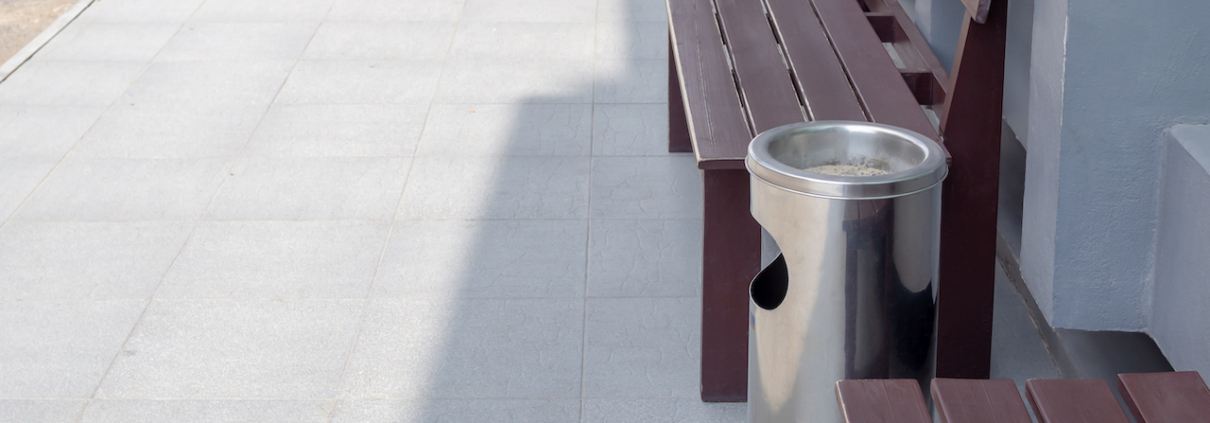Smoking Outside Hospitals: Bans, Laws & Guidelines
In March 2022, Scotland banned smoking outside hospital buildings.
Smoking Ban Outside Hospital Rules in Scotland
The new legislation aims to achieve the following:
- To introduce an enforceable smoke-free perimeter of 15 metres outside of hospital buildings.
- To support the denormalisation of smoking on hospital grounds. This, in turn, should help reduce tobacco use across the population.
- To reinforce the NHS’s position as “an exemplar of health promotion within society”.
- To support people in their efforts to stop smoking.
A secondary aim of the legislation is to prevent and reduce hospital staff and patients’ exposure to second-hand smoke at entrances, and near windows and vents.
The policy became law in September 2022. Now, anyone caught smoking within 15 metres of a hospital building in Scotland could be fined up to £1,000.
Smoking Outside Hospitals Rules Across the UK?
Scotland was not the first UK home nation to ban smoking outside hospitals. Northern Ireland banned smoking on the grounds of any hospital in 2016. However, the law allows for designated smoking rooms “with strict conditions” in care homes and hospices.
Wales introduced legislation in March 2021 requiring all hospital grounds to be smoke-free, with £100 fines for anyone found breaking the law.
England is yet to see an enforceable blanket ban on smoking outside hospitals. However, a 2019 Public Health England (PHE) report found that 69% of NHS trusts in England have banned smoking completely. So it may only be a matter of time before England joins the rest of the UK in outright banning smoking outside hospitals.
How to Improve Air Quality in and Around Hospitals
A recent report found that 25% of UK hospitals are situated in areas with dangerously high levels of air pollution. Improving air quality is a question of reducing the levels of pollutants and other hazardous substances in the atmosphere.
Preventing staff, patients and other visitors from smoking within a certain radius of a hospital can make a positive difference to air quality, as it makes it effectively impossible for harmful second-hand smoke to enter the hospital’s air via doors, windows or vents.
But this is just one strategy by which hospitals can improve the air quality on their premises:
- Strict speed limits – Where possible, hospitals should aim to limit the amount of traffic allowed onsite. But as this may not be practical, they should instead enforce strict speed limits for all onsite traffic. The faster a vehicle travels, the more fuel it burns, and the more harmful emissions it creates. Read our full guide to how speed limits can make a difference to air quality.
- Air quality consultations – Specialist air quality consultants can test the air quality in key locations in and around the hospital. As well as measuring for air pollution levels in public areas of the hospital, they can also test for staff and patient exposure to potentially harmful substances in clinical settings. Read our full guide to how air quality consultants can help reduce air pollution.
- Air filtration and purification – Hospitals can use an advanced heating, ventilation and air conditioning (HVAC) system, along with high-efficiency particulate air (HEPA) filters to regulate airflow and improve air quality through removing viruses, bacteria, and other harmful substances from the atmosphere. Read our full guide to effective air filtration in healthcare settings.
Need a reliable air purification system for your hospital? Take a look at our advanced range of HealthProtect air purifiers for healthcare settings.
Book An Air Quality Consultation For Your Hospital
Unless you’re one of the few remaining NHS trusts in England who still allow for smoking outside hospitals, it’s very likely that your healthcare setting is already benefiting from a reduction in harmful second-hand smoke.
However, even with a smoking ban in place, your hospital may still be at risk from air pollution – particularly if you’re situated near a major road. On top of this, to meet your COSHH obligations, you also need to monitor your staff and patients’ exposure to certain hazardous substances within your hospital.
We offer specialist air quality monitoring for healthcare settings. Our consultants employ both continuous monitoring and personal sampling techniques to demonstrate how pollutant levels in your atmosphere vary over a specified period. As a result, we can produce comprehensive reports based on our findings, including actionable recommendations to help you make a positive difference to your onsite air quality.
Find out more about our Air Quality Monitoring Services or get in touch to talk to one of our experts.



